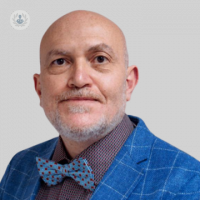Breast cancer and early detection: your best defence for a healthier tomorrow
Escrito por:Breast cancer is the most common cancer in the UK, with around 2.3 million diagnoses a year. In this article, a consultant oncoplastic breast surgeon explains the benefits of early detection of breast cancer, and how to stay on top and up-to-date with breast health.

Breast cancer is less visible and symptomatic in its earliest stages, but it is also easiest to treat at those stages – it will likely be localised to the breast tissue or armpit lymph nodes. Whereas at more advanced stages, it will be more aggressive, deep-rooted, and may have spread to other parts of the body like the chest wall and other organs; this will require intensive treatment that can be difficult for the patients, and may not be entirely successful.
Breast change is typical, and sometimes they can form new bumps, lumps, or change in size monthly. It can be difficult to differentiate between what is normal and what is cause for concern. Noncancerous breast conditions that can be mistaken as breast cancer before diagnosis include: cysts, fibroadenoma, adenosis, mastitis, and papilloma. That is why it is important to have regular breast exams (both clinical and self-exams) and to practice breast self-awareness so that you can familiarise yourself with the various conditions of the breast.
When practising breast self-exams and self-awareness, take note of any:
- New lumps in the breast and underarm
- Nipple discharge or bleeding
- Irregular swelling
- Changes in size or shape
- Swollen lymph nodes in the armpit
- Nipple redness or pain
- Dimples, puckers, bulges, or ridges
- Rashes, sores, itchiness, or scaly skin
Who is more likely to have breast cancer?
The risk factors for breast cancer include:
- Having family members who have a history of breast cancer, especially if they were pre-menopausal at the time
- Having inherited genetic mutations like BRCA1and BRCA2
- Having started to menstruate before 12 years old
- Having started menopause before 55 years old
- Having never been pregnant, or conceiving for the first time after the age of 35
- Taking menopausal hormone medication
How can breast cancer be detected?
A clinical breast exam involves a doctor physically checking the breasts, collarbone area, and underarms. If they are suspicious about anything, they will advise that you get a formal diagnostic scan with a mammogram, which is an X-ray of the specifically the breasts.
It is recommended that patients go to a breast screening every couple of years. Most breast screenings are done with a mammogram. They may be followed up with a breast ultrasound to further analyse any abnormalities or unknown structures found in the mammogram, an MRI for further perspectives on the breast, or a biopsy of breast tissue to examine the cells under a microscope slide.
Why is early detection important for breast cancer?
When discovered in its earliest stage (Stage 1), nearly all patients – a whopping 98 per cent – survive the breast cancer for at least five years after their diagnosis with a high chance of curing it completely without risk of remission. The likelihood for survival remains quite high in Stages 2 and 3, dropping to 90 and 70 per cent, respectively. However, for late diagnoses in Stage 4, there is no possibility of the breast cancer being cured, even with the best treatment, and can only be managed as it will have metastasised too much; the survival rate for a Stage 4 diagnosis is only 25 per cent.
If you are concerned about any abnormalities in your breasts, you can consult with a specialist on Top Doctors.


